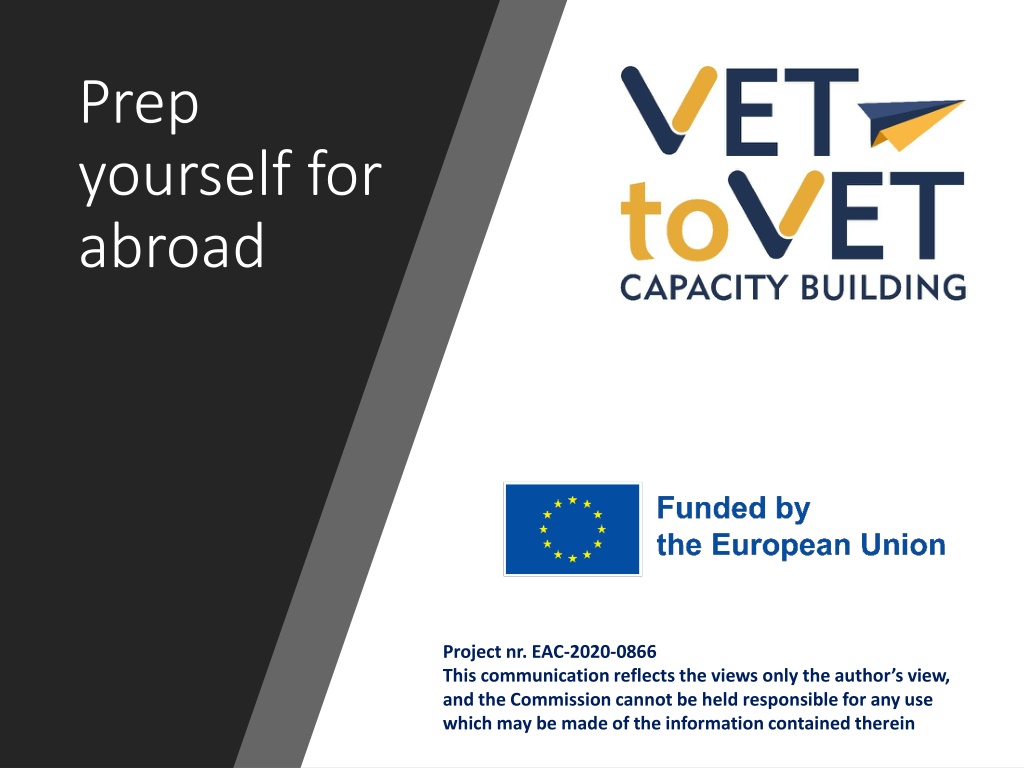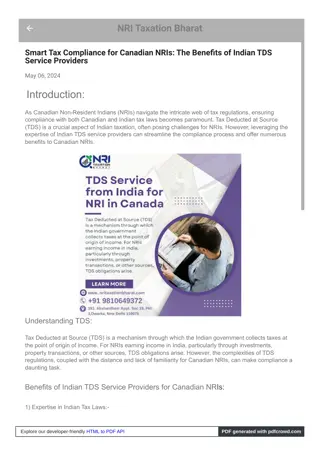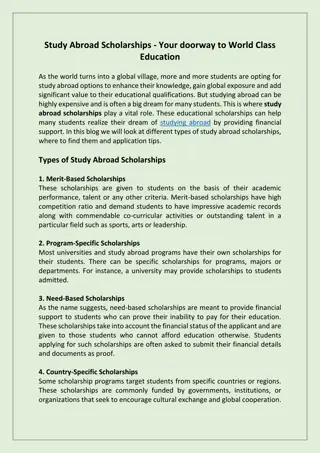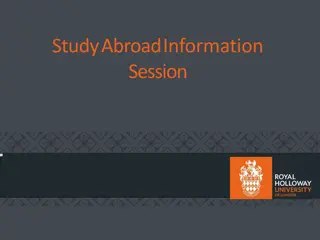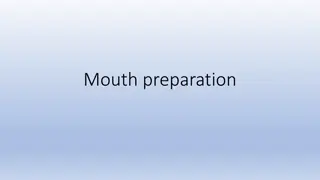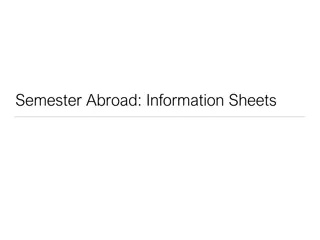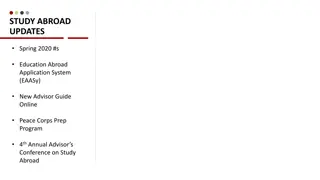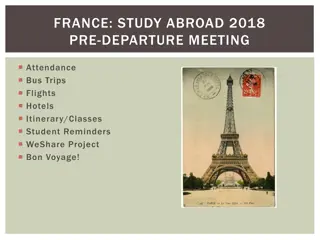Essential Tips for Successful Abroad Project Preparation
Enhance your experience abroad by learning the local language, exploring the culture, familiarizing yourself with the destination's attractions, understanding work-life balance, managing health concerns, practicing time management, and adapting to new experiences. Be proactive in packing, staying organized, and seeking support from contacts when needed to navigate the challenges of being away from home. Embrace personal growth opportunities and build self-confidence through travel and diverse interactions.
Download Presentation

Please find below an Image/Link to download the presentation.
The content on the website is provided AS IS for your information and personal use only. It may not be sold, licensed, or shared on other websites without obtaining consent from the author. Download presentation by click this link. If you encounter any issues during the download, it is possible that the publisher has removed the file from their server.
E N D
Presentation Transcript
Prep yourself for abroad Project nr. EAC-2020-0866 This communication reflects the views only the author s view, and the Commission cannot be held responsible for any use which may be made of the information contained therein
country language learn or improve the local language even a bit Mobility period can be an ideal option to develop and deepen the existing language skills. culture watch a movie (but don t believe it completely) Get to know your destination
city restaurants, sport activities, festivals, events, theatres, concerts museums, shopping malls, cafes , outlets nearby touristic and cultural sights have fun check websites for tourist warnings (be ready, not scared) transportation Get to know your destination
school, work place working hours Study fields, products Get to know your destination study/work-life balance
health information packing travel light check your flight info for baggage restrictions get some local food or sweets (eat it when you miss home) list the items that you can buy at the stores in your host country Most valuable and personal items should be packed in your carry-on luggage to minimize loss if your baggage is misplaced (e.g., money and medicine). Never carry items for strangers consider the temperature changes of your host country Before the trip
time management - be on time Skills to use communication - talk to get the most out of the exchange
New food, unfamiliar road signs, no decent coffee Away from friends and family First few weeks Prep yourself: the fewer surprises, the more in control Don t expect to get everything right straight away. (Everyone gets lost) Explore your new country Make sure to be able to contact when you need. Family Teacher / international coordinator Friends Keep busy, meet people.
New Experiences, new competences Personal Development New Country Career and Professional Growth Travel and Adventure New Circle of Friends Self confidence
What is Culture shock? Introduction Why is it a problem for educators? What are some strategies for minimizing the effects of culture shock?
Culture Shock is: Today we understand culture shock as a reaction people experience when faced with cultural realities that differ from their own personal expectations and norms.
Obergs Stages 1 2 3 4 Honeymoon/ Tourist Stage Culture shock/ rejection Recovery Adjustment/ Acculturation
Unfamiliar rules for social interaction Strange environment and climate Contributing factors Low levels of similarities in beliefs, values, norms, and attitudes Misinterpretations of behaviors and intentions of the other cultural group Motivations for/ traumas associated with traveling to the new culture
Unfamiliarity with the new culture and surroundings Inability to effectively use or understand new language and cultural symbols Causes: Discrepancies between the demands of new situations and the resources for dealing with them Cognitive fatigue
Culture Shock is Manifested: Mentally Emotionally Physically
Symptoms Difficulty in focusing and processing/retaining new information Small aches, pains, and new allergies Sleeping too much or too little Feeling sad, depressed, vulnerable, powerless Decreased confidence, increased apathy Developing stereotypes of the dominant culture
High Anxiety Low Motivation Low Self-confidence Potential Problems for Educators Misinterpretation of culture shock side effects as products of learning disabilities Physical effects that result in frequent absences
Possible other challenges and problems HOUSING PROBLEMS ECONOMIC PROBLEMS NUTRITION PROBLEMS HEALTH PROBLEMS TRANSPORTATION
How to Combat Culture Shock How to Combat Culture Shock Create Keep Count Be Don t try Open Keep in Seek Create a comfortable and accepting environment as individual. Keep busy, be active Count your blessings, stay confident Be patient, be constructive Don t try too hard Open yourself to new possibilities Keep in touch with home Seek support and advice
Culture Shock: case Finland
Cold Land, warm people Coming to Coming to Finland Finland Language strange and hard to learn for foreigners Winter/Summer Bright nights (summer)/dark days (winter)
Cultural differences in greetings Hand shake yes, before COVID Kissing - Not Nod yes
Finnish culture vs. other cultures Silence in Finland Possible differences in etiquette Customer service (too straight?) Food, Salmiakki, Coffee Early warm lunch and warm dinner Sauna, Ice swimming Not so much traffic Visit Finland -10 Things That Will SHOCK You About Finland
Living in Finland Personal space differences? Finns need their own personal space! Services Too straight for foreigners Accommodation Expensive Work Culture Not so much small talk Finns concetrates to the work Payment Prices are shown no need for tips normally
Differences? Time Almost always on time.. Food different? Talking with hands Small talk not so much Dress code Casual?
Reverse Culture shock
